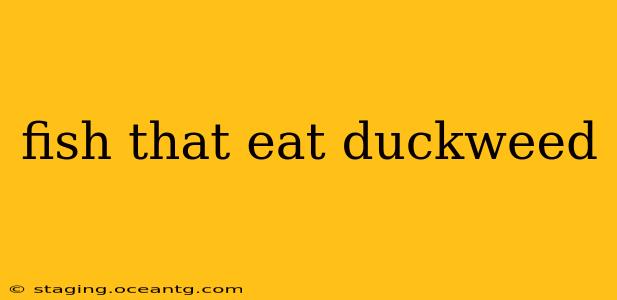Duckweed, while aesthetically pleasing to some, can quickly become an overwhelming nuisance in ponds and aquariums. Fortunately, several fish species are happy to consume this fast-growing plant, offering a natural and effective form of biological control. This guide explores various fish species known for their duckweed-munching habits, along with factors to consider when introducing them to your aquatic ecosystem.
What Kinds of Fish Eat Duckweed?
Many fish species will opportunistically consume duckweed, especially when other food sources are scarce. However, some are more efficient and enthusiastic duckweed eaters than others. Here are some of the top contenders:
-
Common Carp (Cyprinus carpio): While known for their bottom-feeding habits, common carp are also capable of consuming significant quantities of duckweed. Their robust mouths and ability to filter water make them effective at controlling duckweed growth. However, they are also known to be destructive to pond environments if their populations are not managed carefully.
-
Grass Carp (Ctenopharyngodon idella): These are arguably the most effective duckweed control fish. They are herbivores with a voracious appetite for aquatic plants, including duckweed. However, it's crucial to note that grass carp are often sterile and should only be introduced under strict regulations to prevent the establishment of self-sustaining populations. Consult your local fisheries department for guidance.
-
Silver Carp (Hypophthalmichthys molitrix): These filter-feeding fish consume large quantities of phytoplankton and zooplankton, but they may also consume duckweed as an opportunistic food source. They are particularly effective at managing algae blooms. However, like common carp, they can be very disruptive to existing ecosystems if not carefully managed.
-
Tilapia (Oreochromis spp.): Certain tilapia species are omnivorous and will eat duckweed alongside other plant matter and insects. They are relatively hardy and can thrive in a variety of conditions. However, like grass carp, some tilapia species can be invasive, so research your specific species carefully.
-
Koi (Cyprinus carpio koi): While primarily enjoying commercially available fish food, Koi will occasionally consume duckweed, especially if other food is scarce. They're less effective than dedicated herbivores for duckweed control, but can help keep the growth in check as a secondary measure.
What Size Fish Should I Use to Control Duckweed?
The size of the fish you introduce will depend on the size of your pond and the severity of the duckweed infestation. Smaller fish will be less effective at controlling large amounts of duckweed. It's generally advisable to start with a smaller number of larger fish rather than a larger number of smaller fish. Consult with a local pond expert or aquatic specialist for personalized recommendations.
Will Fish Eating Duckweed Eliminate It Completely?
While these fish can significantly reduce duckweed populations, complete eradication is unlikely. Duckweed reproduces rapidly, and even with fish present, some level of duckweed may persist. The goal is typically to maintain the duckweed at a manageable level, preventing it from overwhelming the pond.
What Other Methods Can I Use to Control Duckweed?
Beyond introducing fish, several other methods can help control duckweed:
- Manual Removal: Regularly scooping out duckweed with a net can be effective for smaller infestations.
- Chemical Control: Herbicides are available, but they should be used cautiously as they can harm other aquatic life. Always follow the manufacturer's instructions carefully and consider the environmental impact.
- Biological Control (other than fish): Introducing duckweed-eating insects or other invertebrates can also help.
Are There Any Risks Associated with Introducing Fish to Control Duckweed?
Introducing non-native fish species carries the risk of introducing invasive species. It is crucial to carefully research the species you choose and ensure it’s appropriate for your region and environment. Always check with local authorities or aquatic specialists before introducing any fish. Overstocking your pond with any fish species can also lead to water quality issues.
By carefully selecting appropriate fish species and managing their populations responsibly, you can effectively control duckweed in your pond while maintaining a healthy aquatic ecosystem. Remember to consider the specific needs of your pond and consult with professionals when necessary to ensure the success of your duckweed management strategy.
